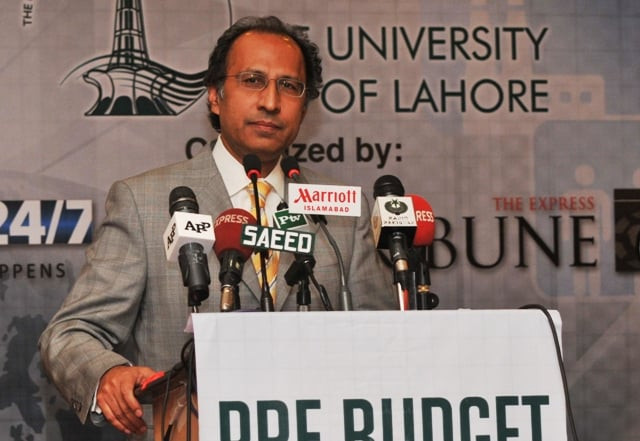Economic Survey 2010-11: Floods, terrorism, oil price surge restrict growth to 2.4%
Hafeez Shaikh reveals missed targets; budget due today.

The worst floods in the country’s history, the ongoing war against terrorism and a spurt in world oil prices pulled back the economy that grew by only 2.4% against a target of 4.5% in the outgoing financial year, said Finance Minister Hafeez Shaikh.
Unveiling the Economic Survey of Pakistan 2010-11, which reviews all sectors of the economy in detail, Shaikh said the floods created the domino effect that not only damaged the agriculture sector but also had a negative impact on the manufacturing and services sectors. Except at the external front, that is the current account, the government missed all economic targets including the most important one – the budget deficit.
“The estimated Gross Domestic Product (GDP) growth might inch up by another 0.1% to 0.2% as final statistics will only be available after June,” Shaikh said. In absolute terms, the size of Pakistan’s economy is estimated at $210.8 billion or Rs18.1 trillion.
“Despite difficult times the government maintained austerity, reduced central bank borrowing and expanded the tax net, which ensured the growth rate of 2.4%,” Shaikh said. The agriculture sector grew by only 1.2% due to growth in the livestock sector, manufacturing sector grew by three per cent and services sector by 4.1%, he said.
Shaikh said that the floods caused losses worth Rs855 billion, of which Rs429 billion was lost only by the agriculture sector. He said that 20 million people were affected and major crops registered a negative growth of four per cent. The floods also disrupted the business cycle, affecting both production and revenue generation. Cotton production declined by 11.3% and the country produced 11.4 million bales this year. Rice production dropped by 30% and remained at 4.83 million tons.
Shaikh said that rampant insecurity had also badly affected the economy. “Pockets in conflict zones remained underdeveloped, which negatively impacted economic growth,” he said.
He said the government was caught off-guard by a surge in world oil prices. It had estimated prices to rise to 75 dollars per barrel but actual increase was 125 dollars per barrel.
Due to this increase, production by power plants dipped as the government could not provide the required quantity of oil for electricity generation. On top of that, the government took a Rs50-billion hit in revenue by not fully passing on the increase to final consumers, he said.
“The power sector was given importance during the last two years for revival of industry and the government gave subsidies worth Rs500 billion to protect the end consumers against a steep rise in the prices of electricity and petroleum products,” Shaikh said.
He said that investment was one area that could have shown some progress but did not due to an unstable security situation, high interest rates, electricity outages and cuts in the Public Sector Development Programme.
In terms of the economy’s total size, investment dipped to 13.4% against last year’s 15.4%. But in absolute terms, total investment grew and stood at Rs2.5 trillion, which is Rs300 billion more than last year.
Shaikh said that the national budget deficit is expected to remain at 5.7% or Rs1.02 trillion. This gap between national income and spending is Rs181 billion more than the revised budget target. But the position of the federal budget deficit is worse which, Shaikh said, is estimated at 6.3% or Rs1.14 trillion.
He said that for budget financing, the government has so far borrowed Rs544 billion, which is Rs114 billion more than last year’s borrowings. He said that so far, the Federal Bureau of Revenue has collected Rs1.3 trillion in taxes and, to achieve the end-of-year target of Rs1.58 billion, it must collect Rs272 billion this month.
On the external front, he said, the government has a “good story to tell”. Exports were healthy and there was encouraging growth in remittances, which will boost business, he said. “The current account is expected to remain in surplus.”
“Despite a bad year, we have to be far-sighted, need to get access to western and European markets and expand the tax base for ensuring macroeconomic stability,” Shaikh said.
Published in The Express Tribune, June 3rd, 2011.
The full text of The Economic Survey 2010-2011 can be viewed here.



















COMMENTS
Comments are moderated and generally will be posted if they are on-topic and not abusive.
For more information, please see our Comments FAQ